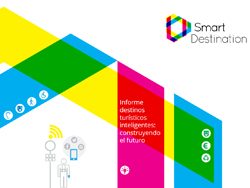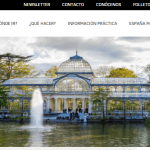The white paper ‘Smart Tourism Destinations: Building the Future’, created by SEGITTUR, is a compilation of the Smart Destination projects carried out up to 2015. It includes information about the areas of action, best practices and collaborative articles linked to the topic.

In an ever-changing environment dominated by the new digital economy, with a tourist profile that is much more demanding, informed, hyper-connected and multi-channelled, the Ministry of Industry, Energy and Tourism decided in 2012 to support the transformation of the Spanish tourism model, based on the concepts of innovation, technology, sustainability and accessibility to guarantee the present and future of tourism in Spain. Thus, the smart tourist destination initiative began. It follows in the footsteps of smart cities, but it focuses on the impact of the millions of tourists arriving in Spain each year (before, during and after their stay). This initiative seeks to better track tourism, manage it more efficiently and sustainably and to increase profitability and competitiveness throughout Spain’s economy.
Best practices
This publication explains in depth what a smart tourism destination is, and its four core areas: innovation, technology, sustainability and accessibility. We also analyse the best practices in some pilot projects in Smart Destinations during this period (2012–2015), seeing, after a diagnostic report on the destination and an action plan drafted by SEGITTUR, how Palma de Mallorca created the largest free Wi-Fi zone in Europe and its tourist monitoring platform; how Las Palmas in Gran Canaria launched the first model to drive shopping tourism in the city through multi-language mobile technology and the first totally digital tourist information office; how Badajoz implemented the first integrated tourist information system which captures and manages millions of structured and unstructured data in real time; and how the island of El Hierro is now considered to be the world’s first smart island.
Public-private partnership
As an initiative based on public-public and public-private cooperation, the protagonists of this transformation must be acknowledged, so the paper includes a wide range of collaborative articles by companies and organisations linked directly or indirectly to the development of smart tourism destinations. These include Cellnextelecom, Amadeus, BBVA, Cisco España, Citourgune, Endesa, Fundación Metrópoli, Global Sustainable Tourism Council, Google, IBM, Fundación Once, Invat.tur, ITH, ITR, Indra, Predif, RECI, Sismotour, Tecnalia, OHL, Telefónica, Conectic, Gnoss, GVAM, Iphonedroid, Mobdala, The Appdate, Globaldit and AENOR.
Finally, once the basis for this new tourism model has been established and the first integrated projects have been launched, this initiative needs to be taken up throughout Spain by the public and private sectors. To this end, we have gathered all the necessary information on sources of funding to facilitate the transformation of destinations, offered by the Ministry of Industry, Energy and Tourism through the National Smart Cities Plan, Emprendetur and FOMIT, as well as the European Union through ERDF funds.







